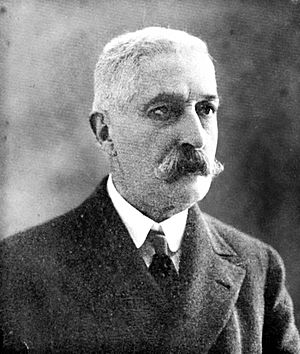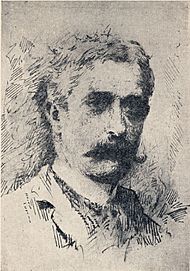Giovanni Verga facts for kids
Quick facts for kids
Giovanni Verga
OCI, OSML
|
|
|---|---|
 |
|
| Senator of the Kingdom of Italy | |
| In office 3 October 1920 – 27 January 1922 |
|
| Monarch | Victor Emmanuel III |
| Personal details | |
| Born |
Giovanni Carmelo Verga
2 September 1840 Vizzini, Kingdom of the Two Sicilies |
| Died | 27 January 1922 (aged 81) Catania, Kingdom of Italy |
| Nationality | Italian |
| Occupation | Writer |
| Signature | |
Giovanni Carmelo Verga (born September 2, 1840 – died January 27, 1922) was a famous Italian writer. He is known for his realistic stories about life in his home region of Sicily.
Verga was a key figure in a writing style called verismo. This style focused on showing life as it really was, especially for ordinary people. His most famous works include the short story Cavalleria rusticana and the novel I Malavoglia (which means The House by the Medlar Tree).
Who Was Giovanni Verga?
Giovanni Verga was born in Catania, Sicily, into a well-off family. He was the first son of Giovanni Battista Catalano Verga and Caterina Di Mauro. From a young age, he showed a talent for writing.
He started writing when he was a teenager. One of his first works was a historical novel called Amore e Patria (Love and Country). Even though he was supposed to be studying law at the University of Catania, he used money from his father to publish his early books.
In 1861 and 1862, he published I carbonari della montagna (The Carbonari of the Mountain). This was followed by Sulle lagune (On the Lagoons) in 1863.
Developing His Writing Style
Verga served in the Catania National Guard from 1860 to 1864. After this, he traveled to Florence many times and settled there in 1869.
In 1872, he moved to Milan. Here, he developed a new way of writing. He started using dialogue (what characters say) to show who the characters were. This new style led to his most important books.
In 1880, he released a collection of stories called Vita dei campi (Life in the Fields). Most of these stories were about life in rural Sicily. This collection included well-known tales like "Fantasticheria" ("Daydreaming"), "La lupa" ("The She-wolf"), and "Rosso Malpelo".
Famous Works and Legacy
One of the stories in Vita dei campi was "Cavalleria rusticana" ("Rustic Chivalry"). Verga later turned this story into a play. This play then became the basis for several famous operas, including Mascagni's Cavalleria rusticana.
Verga planned to write a series of five novels called the Ciclo dei vinti. These books were meant to explore the challenges people faced when trying to improve their social and economic lives. However, he only finished two of them.
The two completed novels were I Malavoglia (published in 1881) and Mastro-don Gesualdo (published in 1889). Both of these books are considered masterpieces of Italian literature. Mastro-don Gesualdo was the last major work of his writing career.
In 1894, Verga moved back to Catania, to the house where he grew up. In 1920, he was given the important title of Senator of the Kingdom for life. He passed away in 1922 from a brain thrombosis.
Today, the Teatro Verga (Verga Theater) in Catania is named after him. His childhood home in Catania is now a museum called the Casa-Museo Giovanni Verga. He was an atheist.
See also
 In Spanish: Giovanni Verga para niños
In Spanish: Giovanni Verga para niños
 | Tommie Smith |
 | Simone Manuel |
 | Shani Davis |
 | Simone Biles |
 | Alice Coachman |


